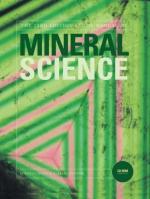|
This section contains 1,401 words (approx. 5 pages at 300 words per page) |

|
Mineralogy is the study of minerals. Rocks in the earth's crust are composed of one or more minerals. A mineral in the geologic sense is a naturally occurring, inorganic, crystalline solid. A particular mineral has a specific chemical composition. Each mineral has its own physical properties such as color, hardness, and density.
Most minerals are chemical compounds that are made of two or more different elements. The composition of a mineral is shown by its chemical formula, which states each of the chemical elements present in the mineral as well as the ratios of each element. For example, the mineral quartz has the chemical formula SiO2. This means that quartz is made of the elements silicon (Si) and oxygen (O). The formula also shows that for every one silicon atom, two oxygen atoms are present. The mineral orthoclase has the chemical formula KAlSi3O8. A molecule of orthoclase...
|
This section contains 1,401 words (approx. 5 pages at 300 words per page) |

|


